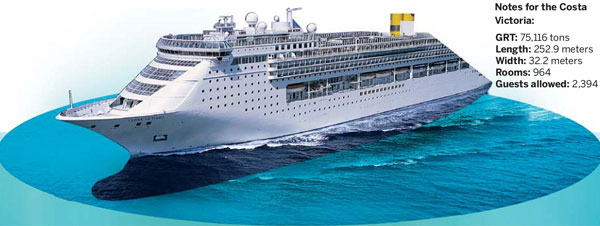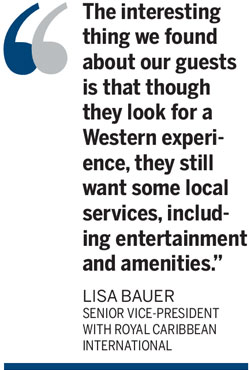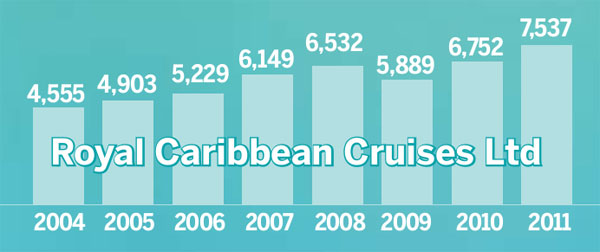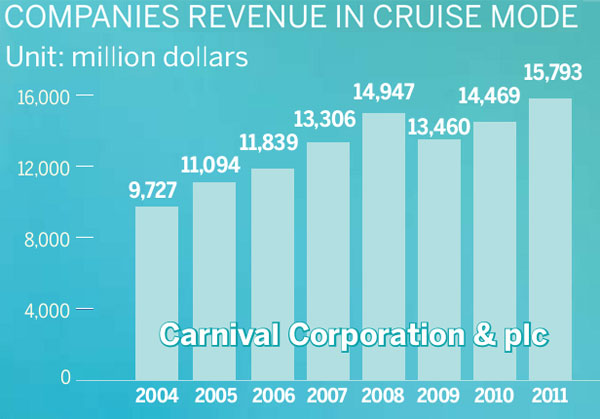Come on let's cruise
Updated: 2012-10-03 11:01
By Lin Jing and Li Xiang (China Daily)
|
||||||||
More and more Chinese are spending their holidays on board luxury ships
Most Chinese people probably equate cruise ships to the one depicted in the movie Titanic, a giant ship on the sea with various recreation facilities - hold the icebergs, of course. These ships are a symbol of a high-end life style, and it isn't hard to picture the gentlemen and ladies on board dancing around at an evening cocktail party.
In the past few years, however, traveling by cruise has become less a luxury and more a new form of leisure. Data from the China Cruise & Yacht Industry Association (CCYIA) show that in 2011, 262 international cruise voyages stopped in China, a 17.5 percent increase compared with 2010. Among them, a total of 142 departed from coastal areas in China, up by 49.5 percent, while 128 were from cruises visiting China, a 68.4 percent increase.
 |
Liu Chang is really looking forward to her first cruise experience during the National Day holidays.
"For me, traveling by cruise is a brand new way of traveling. I have always wanted a cruise. It will be a great vacation," says Liu, 24.
She chose Royal Caribbean's Voyager of the Seas, one of the world's largest cruise ships, to travel with her parents, younger brother and grandparents. Her trip, from Tianjin to Fukuoka in Japan and then to Busan in South Korea, will cost about 40,000 yuan ($6,308) for six days and five nights.
Qian Yongchang, president of the China Communication and Transportation Association, says that from the travelers' perspective, cruise trips can save the trouble of dragging luggage around and spending extra money on food and hotels.
"As Chinese people have more disposable income and holidays, they should explore a new way of recreation, not just climbing mountains and visiting scenic spots," he says.
Huang Ruiling, general manager with Mediterranean Cruises Travel Agency (Shanghai) Co, the Chinese division of European cruise giant MSC Cruises, says cruises are different from other means of travel and are more suitable for families.
Something for all
 |
 |
Tianjin resident Ye Anjin, 52, joined an eight-day, seven-night trip to Japan and South Korea organized by her company. Though not quite aware of the facilities available on board, she knows that the service there will be of "international standard".
"I guess that activities on board will be like Titanic, very high-end and refined," she says.
"China is one of the most important strategic markets for Royal Caribbean International," says Lisa Bauer, senior vice-president with Royal Caribbean International, a cruise operator headquartered in Miami, US.
In June, the company, which has been in China for five years, sent Voyager of the Seas to China, where it will make 18 voyages from Chinese ports over a one-year period. In 2013, the company will introduce another ship to China, Mariner of the Seas, which is equal in size to its predecessor.
She says that the company will continue to introduce more high-quality products and innovative choices for Chinese consumers as it is encouraged by the feedback it has received from guests.
To better attract Chinese vacationers, foreign cruise operators such as Royal Carribean now offer customized services.
She says that the company will offer Chinese-language services, Chinese menus and merchandise and brands favored by Chinese consumers at tax-free shops.
Costa Crociere S.p.A, Europe's largest cruise company and the first to enter China, has also added Chinese services from bilingual crew to Chinese menus on their cruise ships.
Buhdy Bok, vice-president of Costa China, says that Costa's bookings this year are very positive in China and the company has increased the relevant elements in Costa Victoria, its cruise ship currently serving in China.
The company is set to introduce a second cruise ship, Costa Atlantica, in Shanghai in 2013.
Some companies also cater to the different holiday schedule in China. Since 2011, MSC has offered a Chinese New Year-themed cruise for Chinese passengers.
Wu Gaoxian, CEO of Star Cruises, the only Asian-based international cruise company, says that the essence of cruise culture is leisure. "The purpose of cruise is not the destination, but the experience on board," he says.
 |
 |












